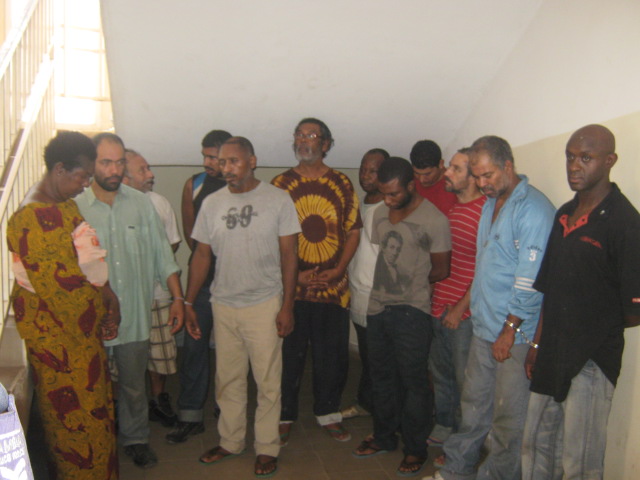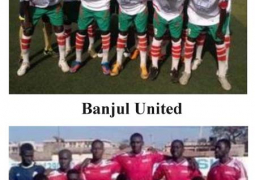
Momodou Lamin Kebbeh the alkalo (village head) of Bonto village yesterday testified as the first prosecution witness in the trial of nine accused persons at the narcotics court at Banjul Magistrates' Court, who were recently arrested with the illicit drug cocaine worth over one billion United States dollars.
The nine accused persons are: Ephriam Micheal Chiduben a Nigerian national, Juan Carlos Sanchez, Eric Bottini, Dose Fermin, Juan Carlos Diaz, and Esteaban Zavala all Venezuelan nationals, George Sanchez a Mexican/Liberian national, as well as Rudy Rasoehamid Gazi and Dennis Wilgo Winter both Dutch nationals.
They all pleaded not guilty to the new charges of conspiracy to traffick in prohibited drugs, trafficking in drugs, dealing in prohibited drugs, having firearm without authority, importation of firearm without authority, among others.
In his testimony, Momodou Lamin Kebbeh told the court that he is the alkalo (village head) of Bonto village in the Kombo East district of the Western Region, for 11 years now.
He said he recognised the some of the accused persons, but he knew the 1st accused person, Rudy Rasoehamid Gazi, and 2nd accused, Juan Carlos, in court.
Mr. Kebbeh said he would be able to identify the 3rd,, 7th,, 8th accused persons in Bonto, as they frequently came there, and he also knew Eric Bottani, Dose Fermin and Esteaban Zavala.
"I knew one man called Pepe, who is said to be at large," he added.
According to him, the 1st accused, Rudy Rasoehamid Gazi, has a number of fishing boats, which he used for fishing shrimps.
Mr. Kebbeh testified that the 1st accused once came to the village, and informed them that he has strangers who were coming to The Gambia in connection with a new fishing project, and that he needed a plot of land near the river-side to construct a fish store.
He said the villagers welcomed the development, because before the sea waves disturbed the women's garden, and that if there is such a project, it would help the village a lot.
He added the villagers then accepted to give him a plot of land, and the 1st accused was so happy that he suggested to build an Arabic Islamic school for their children.
PW1 further told the court that when shrimps season started the 1st accused used to come to Bonto to collect the shrimps.
He adduced that after the store was build the first accused fenced it with barbed wire, and that the 1st, 2nd accused persons and Pepe always locked the gate with their own keys.
Alkalo Kebbeh further told the court that after finishing building the store, the first accused started to bring containers to the store, but as the village head he did not know what was in the containers, because they trusted him, and, moreover, it's a large compound.
The 1st and 2nd accused persons, he added, were always coming in and out of Bonto, at any time they feel like, and the only man who stayed in the store was Pepe, said to be at large. He added that the 1st and 2nd accused persons came to the store from time to time.
Mr. Kebbeh further told the court that when the accused persons were busy, at their factory in Kanifing, they would stay there, sometimes for more than one week, before they returned to Bonto.
He revealed that the 2nd accused, Juan Carlos, was not staying in Bonto, but comes there from time to time. The accused persons whose names he did not know also did not stay in Bonto, but came there from time to time.
He said since the 1st, 2nd accused and Pepe were linked to the store whoever they saw in the store was believed to be working for the same project with the 1st accused.
What eventually happened was a disappointment, because the villagers gave the land to the 1st accused so that their children could work in the said project. However, to their surprise, one day they saw about 18 security vehicles line-up at the store, and they came to learn that they used the store to store drugs, instead of fish.
The villagers also learned that the security officers had discovered drugs in the store amounting to two and half tonnes of cocaine, and that was how the villagers came to know that the 1st accused was dealing with drugs, instead of the shrimps, Kebbeh added.
The villagers then happened to know that the purpose of the store has been defeated by the 1st, 2nd accused and Pepe.
At this juncture, defence counsel representing the accused persons, LS Camara, objected on the grounds that what the witness was saying was hearsay evidence.
He cited section 19 (A) of the Evidence Act, which he also read in court. Counsel quoted the witness as saying, "we heard that", and submitted that this was hearsay, which going by the rules of evidence will be inadmissible. Counsel added that under section 20 of the Evidence Act such evidence was inadmissible.
"I urged your worship to disallow that potion of the evidence of the witness, and it be expunged," Camara further submitted.
In response, the Director of Public Prosecutions, R.N Chenge, cited section 19 (B) of the Evidence Act under which, he said, the witness evidence is admissible.
DPP Chenge added, "we are bringing evidence to show that the witness is an authority who received the information, and my next question will be what he did when he received the information."
Subsequently, the defence counsel's objection was overruled by the trial magistrate.
Meanwhile, the witness continuing to testify said that, on the following day, "I heard that an amount of 2040 kilos of drugs was found at the store of the 1st accused. I went to the place, but I did not find anything there, because they had taken the drugs away".
"I saw the place when it was under construction (the bunker), and the width was not exceeding 1.5 meters and the length was about 15 meters; and they said they wanted to use it as a fuel depot," he told the court.
He revealed that they tiled the floor and the sides, and when they also noticed that water was seeping from underneath, they poured concrete on it, and said it was because of the flooding.
The alkalo told the court that the store at Bonto village consists of an office, and two toilets for female and male. He added that he was afraid to visit the place where the bunker was, since the arrest of the 1st accused, Rudy Hamid Ghazi, and others.
He also said that after the arrest and discovery of the drugs, 30 security guards were stationed there, and they change shift every Friday, adding that the guards have never allowed him to go near where the drugs were found.
Alkalo Kebbeh said he last saw the 1st accused person eight days before his arrest, while Pepe another suspect said to be at large, he last saw two days before, and Carlos, the 2nd accused, he last saw not more that two weeks before.
The case was adjourned to 16th September 2010 for continuation of the hearing.
Meanwhile, the earlier defence objection to the trial on the grounds that the narcotics court in Banjul lacks jurisdiction was overruled by the trial magistrate.


